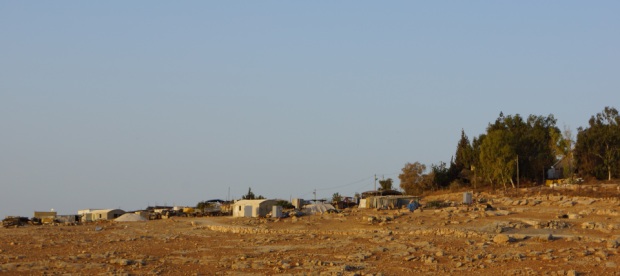This release was something I wrote up after my teammate Gabriel and I went out to the South Hebron Hills on Monday and Tuesday to fulfill our commitment to accompany Al-Fakheit school and the SUV donated by UNICEF and the government of Japan to bring the children to Al-Fakheit and Khirbet al-Majaz schools (the schools have demolition orders and the SUV has been confiscated by the Israeli military). We were with EAPPI, Ta’ayush, and Operation Dove at the Umm al-Kher meeting. In the end the people there were more upset that the Palestinian authority was giving a lot more aid to people in much less precarious positions than they were in.
SOUTH HEBRON HILLS: Umm al-Kher facing settler attacks, settlement expansion and a lawsuit from Karmel
SOUTH HEBRON HILLS: Umm al-Kher facing settler attacks, settlement expansion and a lawsuit from Karmel
Umm al-Kher is a village of about 135 people from the al-Hathaleen Bedouin who fled from their original lands near the Israeli city of Arad in during the war of 1948 to the South Hebron Hills. They subsequently suffered the further bad luck of having the Israeli settlement of Karmel move next door in the early 1980s. Water pipes and electricity run through their land to the settlement, but the Israeli Civil Administration does not allow residents of Umm al-Kher are to connect to the grid. They use solar panels for electricity and firewood, goat and sheep dung to fuel their stoves. They derive almost all their income from their flocks.
CPTers went out to Umm al-Kher on 3 February with a representative of the United Nations because of some recent attacks by Karmel settlers on the villagers. Since men of the village had received threats of arrest if they got into altercations again with the settlers, women had been taking the sheep and goats to their grazing land, but settlers had attacked them as well.
At issue is the route along which the villagers had been herding their flocks to the grazing field. Settlers had prevented the shepherds from taking a direct route across a hilltop, planting trees as a way of staking a claim to it. (A representative of the Israeli group, Ta’ayush, at the meeting pointed out that Karmel is planning on establishing a new neighborhood there, so these trees will be uprooted if they succeed in doing so.) The shepherds must take a forty-minute detour if they cannot cross the hilltop, which is harmful to their pregnant ewes; one pregnant ewe had died after making the longer walk.
The community’s taboun oven has also long been a target of the Karmel settlers’ anger, because they object to the smoke emitted when the residents of Umm al-Kher are baking bread. The settlers have tried to destroy the taboun several times and are currently suing the community for 100,000 shekels for the damage they say the smoke is causing to their health. As the U.N. representatives were discussing options that might make the taboun more acceptable, Ta’ayush members strongly backed the villagers, who did not want to switch to a source of fuel for which they would have to pay. The Ta’ayush activists asserted that the taboun had been there long before Karmel had, and Umm al-Kher should not have to make compromises to accommodate the settlers.
An Umm al-Kher resident noted that one of the Karmel settlers who has committed attacks on community before is a police officer at the settlement of Kiryat Arba, which borders Hebron. “I see him leaving for work every morning in his police uniform,” he said. “I know if I respond to his attacks, I would be charged with assaulting a police officer.”
Despite these difficulties, the residents of Umm al-Kheir have decided they do not need internationals living in their village all the time, but rather would prefer they be available on an on-call basis. (An EAPPI unit lives in Yatta and Operation Dove lives in At-Tuwani. CPT spends an overnight in the South Hebron Hills once a week.) The court has recognized their right to access their grazing lands and they do not believe that the lawsuit against the taboun will succeed. However, when one looks at its dwellings made of recycled materials and compares them to the expanding, western-style housing of Karmel, its situation seems precarious indeed.
[Note: This 2009 video of home demolitions in Umm al-Kher profiles Ta’ayush activist Ezra Nawi, who was present and providing translation for Umm Al-Kheir residents at the 3 February 2014 meeting.]


You must be logged in to post a comment.